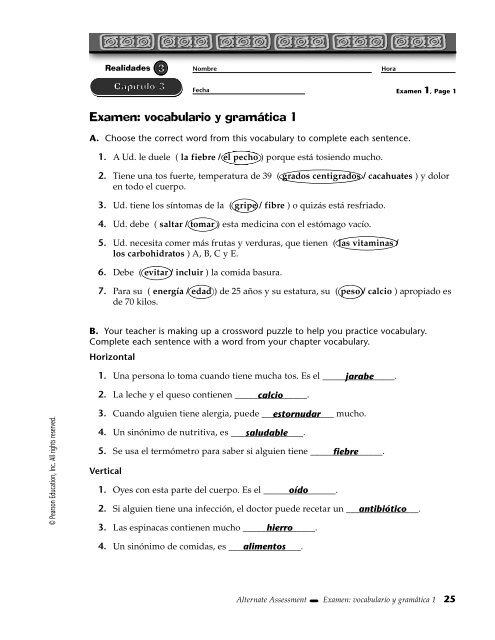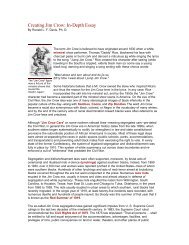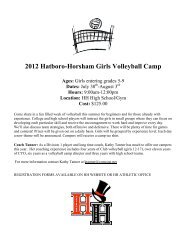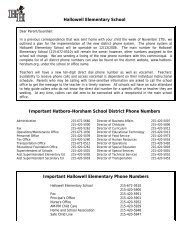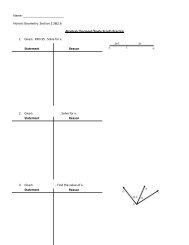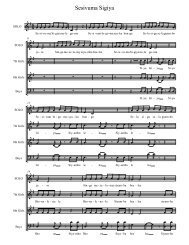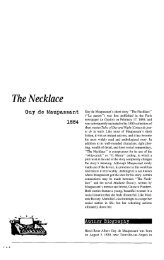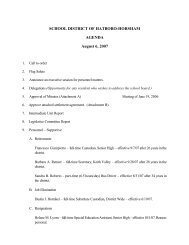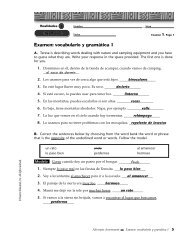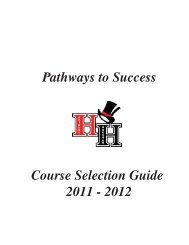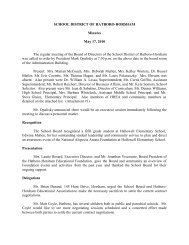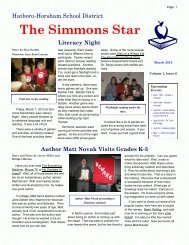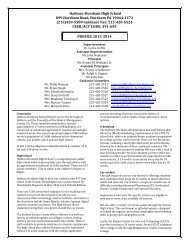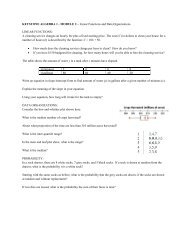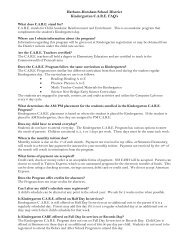Examen: vocabulario y gramática 1
Examen: vocabulario y gramática 1
Examen: vocabulario y gramática 1
Create successful ePaper yourself
Turn your PDF publications into a flip-book with our unique Google optimized e-Paper software.
Realidades<br />
Nombre<br />
Hora<br />
Fecha<br />
<strong>Examen</strong> 1, Page 1<br />
<strong>Examen</strong>: <strong>vocabulario</strong> y gramática 1<br />
A. Choose the correct word from this vocabulary to complete each sentence.<br />
1. A Ud. le duele ( la fiebre / el pecho ) porque está tosiendo mucho.<br />
2. Tiene una tos fuerte, temperatura de 39 ( grados centigrados / cacahuates ) y dolor<br />
en todo el cuerpo.<br />
3. Ud. tiene los síntomas de la ( gripe / fibre ) o quizás está resfriado.<br />
4. Ud. debe ( saltar / tomar ) esta medicina con el estómago vacío.<br />
5. Ud. necesita comer más frutas y verduras, que tienen ( las vitaminas /<br />
los carbohidratos ) A, B, C y E.<br />
6. Debe ( evitar / incluir ) la comida basura.<br />
7. Para su ( energía / edad ) de 25 años y su estatura, su ( peso / calcio ) apropiado es<br />
de 70 kilos.<br />
B. Your teacher is making up a crossword puzzle to help you practice vocabulary.<br />
Complete each sentence with a word from your chapter vocabulary.<br />
Horizontal<br />
1. Una persona lo toma cuando tiene mucha tos. Es el ________________.<br />
jarabe<br />
2. La leche y el queso contienen ________________.<br />
calcio<br />
© Pearson Education, Inc. All rights reserved.<br />
3. Cuando alguien tiene alergia, puede ________________ estornudar mucho.<br />
4. Un sinónimo de nutritiva, es ________________.<br />
saludable<br />
5. Se usa el termómetro para saber si alguien tiene ________________.<br />
fiebre<br />
Vertical<br />
1. Oyes con esta parte del cuerpo. Es el ________________.<br />
oído<br />
2. Si alguien tiene una infección, el doctor puede recetar un ________________.<br />
antibiótico<br />
3. Las espinacas contienen mucho ________________.<br />
hierro<br />
4. Un sinónimo de comidas, es ________________.<br />
alimentos<br />
Alternate Assessment <strong>Examen</strong>: <strong>vocabulario</strong> y gramática 1 25
Realidades<br />
Nombre<br />
Hora<br />
Fecha <strong>Examen</strong> 1, Page 2<br />
C. You are asking your mother whether you can do some things you’d like to do. She<br />
answers “yes” with a command in the tú form. Complete each sentence with a verb in<br />
the affirmative tú command form. The first one has been done for you.<br />
toma<br />
Modelo: Mamá, ¿tomo la medicina? Sí, ________________ la medicina.<br />
1. ¿Pongo la comida en la mesa? Sí, ________________ pon la comida en la mesa.<br />
2. ¿Voy al mercado ahora? Sí, ________________ ve ahora.<br />
3. ¿Abro la ventana ahora? Sí, ________________ abre la ventana, por favor.<br />
4. ¿Salgo de casa a las siete? Sí, ________________ sal a las siete.<br />
5. ¿Como comida nutritiva? Sí, ________________ come comida nutritiva.<br />
6. ¿Hago la cena esta noche? Sí, ________________ haz la cena.<br />
7. ¿Ayudo a mi hermanita? Sí, ________________ ayuda a tu hermanita.<br />
D. You have some more questions for your mother. This time, she doesn’t agree with<br />
your plans. Complete each sentence with a verb in the negative tú command form.<br />
1. ¿Sirvo las frutas con crema? No, no ________________ sirvas las frutas con crema.<br />
2. ¿Me despierto tarde mañana? No, no ________________ te despiertes tarde.<br />
3. ¿Como un helado grande? No, no ________________ comas un helado grande.<br />
4. ¿Voy a la playa con mis amigos? No, no ________________ vayas a la playa.<br />
5. ¿Le doy pizza al perro? No, no le ________________ des pizza al perro.<br />
6. ¿Salgo tarde esta noche? No, no ________________ salgas tarde.<br />
© Pearson Education, Inc. All rights reserved.<br />
26 Alternate Assessment <strong>Examen</strong>: <strong>vocabulario</strong> y gramática 1
Realidades<br />
Nombre<br />
Hora<br />
Fecha<br />
<strong>Examen</strong> 1, Page 3<br />
E. Dr. Daórdenes has lots of advice for his adult patients. Complete each sentence with<br />
the affirmative Ud. or Uds. command form of the verb in parentheses. Follow the<br />
models.<br />
Modelos:<br />
coman<br />
salga<br />
Sr. y Sra. Engracia, ________________ (comer) más verduras.<br />
Sra. Ramos, no ________________ (salir) cuando hace frío.<br />
1. Srta. García, ________________ escuche (escuchar) mis consejos.<br />
2. Sr. y Sra. Nuncio, ________________ vayan (ir) a ver al especialista.<br />
3. Sr. y Sra. Sotelo, no ________________ coman (comer) tanta comida basura.<br />
4. Srta. Sánchez, no ________________ se acueste (acostarse) tarde.<br />
5. Sr. Santiago, siempre ________________ tome (tomar) su medicina por la mañana.<br />
6. Sr. y Sra. Santos, ________________ hagan (hacer) más ejercicio.<br />
7. Sra. Moreno, por favor no ________________ estornude (estornudar) en mi camisa.<br />
F. Write each Uds. command with the correct direct or indirect object pronoun.<br />
Some will be negative (negativo) and some will be affirmative (afirmativo). Remember<br />
to add accent marks when needed. Follow the models.<br />
Modelo 1: Uds. no compraron las frutas. Cómpran______ ahora.<br />
Modelo 2: Uds. ya tomaron la medicina para hoy. No _____ ________ más.<br />
Afirmativo<br />
las<br />
la<br />
tomen<br />
© Pearson Education, Inc. All rights reserved.<br />
1. Uds. no hicieron la tarea ayer. ______________ Háganla ahora.<br />
2. Señores, ayer Uds. no leyeron los informes. La próxima vez, ______________ léanlos antes<br />
de salir.<br />
3. Uds. no trajeron sus papeles. ______________ Tráiganlos mañana, por favor.<br />
Negativo<br />
4. Uds. pusieron las botas encima de la cama. No _____ las ______________ pongan allí.<br />
5. Sofía y Lupe, Uds. pidieron pizzas cinco veces. No _____ las ______________ pidan más.<br />
6. Ya encontramos lo que Uds. habían buscado. No _____ lo ______________ busquen más.<br />
Alternate Assessment <strong>Examen</strong>: <strong>vocabulario</strong> y gramática 1 27
Realidades<br />
Nombre<br />
Hora<br />
Fecha <strong>Examen</strong> 2, Page 1<br />
<strong>Examen</strong>: <strong>vocabulario</strong> y gramática 2<br />
A. Your friends are asking you for advice. Complete each sentence with a word from<br />
the word bank.<br />
abdominales calambres cinta desarrollar estirar<br />
1. —¿Qué haces para ________________ desarrollar músculos más fuertes en el estómago?<br />
—Yo hago ________________.<br />
abdominales<br />
2. —¿Qué puedo hacer para evitar los calambres en los músculos? Me duelen las<br />
piernas.<br />
—Es importante flexionar y ________________ estirar los músculos antes de hacer ejercicio.<br />
3. —Quiero entrenarme para la carrera de los 5 kilómetros.<br />
—Debes hacer bicicleta, o si te gusta caminar debes hacer ________________.<br />
cinta<br />
B. Enrique always repeats what his friends say, using different words. Read each<br />
sentence and circle the word or phrase that means the opposite of the underlined<br />
word or phrase.<br />
1. —Tengo brazos débiles.<br />
—Sí, tienes que hacer más ejercicio, tus brazos no están fuertes.<br />
2. —Últimamente, me siento muy relajada.<br />
—Sí, veo que no estás estresada.<br />
3. —No puedo concentrarme en clase. Estoy enamorado.<br />
—Es cierto, en clase siempre estás en la luna, pensando en esa chica.<br />
4. —María siempre se está riendo y nunca pelea con nadie.<br />
—Tienes razón, ella nunca está de mal humor. No se enoja nunca.<br />
© Pearson Education, Inc. All rights reserved.<br />
28 Alternate Assessment <strong>Examen</strong>: <strong>vocabulario</strong> y gramática 2
Realidades<br />
Nombre<br />
Hora<br />
Fecha<br />
<strong>Examen</strong> 2, Page 2<br />
C. There is a 5 kilometer race tomorrow, and your coach is giving a pep talk to you and<br />
your teammates. To understand her advice, complete each sentence with the correct<br />
subjunctive form of the verb in parentheses.<br />
Es importante que Uds. 1.__________________ entiendan (entender) por qué están aquí y<br />
2.__________________ se den (darse) cuenta de la importancia de esta carrera. Por eso quiero que<br />
esta noche 3.__________________ se acuesten (acostarse) temprano y 4.__________________ duerman (dormir)<br />
ocho o nueve horas. Les sugiero que 5.__________________ lleguen (llegar) al estadio temprano.<br />
Es importante que 6.__________________ estén (estar) allí una hora antes de la carrera.<br />
Tú, Luis, quiero que 7.__________________ seas (ser) puntual. Es necesario que Uds.<br />
8.__________________ hagan (hacer) flexiones y 9.__________________ practiquen (practicar) la salida (start).<br />
Quiero que 10.__________________ coman (comer) algo nutritivo si tienen hambre, pero no<br />
mucho, porque tampoco es buena idea que 11.__________________ se llenen (llenarse) el estómago<br />
con comida. Es importante que 12.__________________ se sientan (sentirse) fuertes. Ojalá que no<br />
13.__________________ llueva (llover) y que todos Uds. 14.__________________ ganen (ganar) medallas.<br />
¡Buena suerte!<br />
© Pearson Education, Inc. All rights reserved.<br />
Alternate Assessment <strong>Examen</strong>: <strong>vocabulario</strong> y gramática 2 29
Realidades<br />
Nombre<br />
Hora<br />
Fecha <strong>Examen</strong> 2, Page 3<br />
D. Before she heads out for the day, Sra. Santos tells her children what she wants them<br />
to do. Complete each sentence by writing the correct subjunctive form of the verb in<br />
parentheses.<br />
Ella quiere que Marta 1.__________________ lave (lavar) la ropa y que después<br />
2.__________________ vaya (ir) a la clase de yoga. No quiere que ella<br />
3._____ se ____________ quede (quedarse) conversando en el club después de la clase. Quiere<br />
que 4.__________________ vuelva (volver) pronto a casa y 5.__________________ empiece (empezar) a<br />
estudiar. Mamá también quiere que Pepe 6.__________________ caliente (calentar) la comida que<br />
dejó en el refrigerador y nos la 7.__________________ sirva (servir) de almuerzo. No quiere que<br />
nosotros 8.__________________ pidamos (pedir) pizza. Quiere que 9.__________________ comamos (comer)<br />
alimentos nutritivos. Quiere que Felipe 10.__________________ saque (sacar) la basura y que<br />
11.__________________ corte (cortar) el césped. Y a mí me dijo: “Laura, quiero que tú arregles<br />
tu dormitorio, que lo 12.__________________ pongas (poner) todo en su lugar, y que<br />
13.__________________ escribas (escribir) tu composición”. Después, quiere que nosotros<br />
14.__________________ juguemos (jugar) y nos divirtamos.<br />
© Pearson Education, Inc. All rights reserved.<br />
30 Alternate Assessment <strong>Examen</strong>: <strong>vocabulario</strong> y gramática 2
Realidades<br />
Nombre<br />
Hora<br />
Fecha<br />
<strong>Examen</strong> del capítulo 3, Page 1<br />
EXAMEN DEL CAPÍTULO 3<br />
A. Escuchar (___/___ puntos)<br />
Dr. Moya hosts a popular radio show. People call in and describe their symptoms,<br />
and the doctor gives them advice. Listen to each caller. Find out the following:<br />
(1) the caller’s symptoms, (2) what he or she should take, and (3) what the doctor<br />
advises. While you listen, you can take notes in the table below titled “Mis apuntes.”<br />
Then complete the bottom table. You will hear each conversation twice.<br />
MIS APUNTES (notes)<br />
Luisa<br />
Juan<br />
Marta<br />
Alberto<br />
Catrina<br />
¿Qué síntomas ¿Qué debe ¿Qué más le aconseja<br />
tiene? tomar? el médico?<br />
© Pearson Education, Inc. All rights reserved.<br />
Luisa<br />
Juan<br />
Marta<br />
Alberto<br />
se siente cansada / vitaminas seguir una dieta<br />
se duerme durante<br />
equilibrada / dormir<br />
las clases<br />
más /evitar la comida<br />
basura / no saltar<br />
el desayuno<br />
tiene tos / tiene fiebre / aspirinas descansar / tomar<br />
estornuda<br />
muchos jugos, agua<br />
y sopa<br />
estornuda, le duelen una medicina para evitar ir al campo<br />
la nariz y los ojos la alergia<br />
tiene tos / tiene fiebre / antibióticos y<br />
descansar por lo<br />
le duele el pecho aspirinas menos una semana<br />
Catrina<br />
tiene estrés / está de un vaso de leche hacer yoga / reírse más /<br />
mal humor caliente trabajar menos / ver<br />
programas cómicos<br />
Students must include at least one of the answers in their grid to receive one point<br />
for each square.<br />
Alternate Assessment <strong>Examen</strong> del capítulo 3 31
Realidades<br />
Nombre<br />
Hora<br />
Fecha <strong>Examen</strong> del capítulo 3, Page 2<br />
B. Leer (___/___ puntos)<br />
Three teens are looking for a personal trainer, but each one has different needs. Pablo<br />
wants to lose weight; Luis wants big, strong muscles; and Teresa wants to have more<br />
energy. Read the ads for three trainers. Then, complete the table below.<br />
1. NUESTRO ENTRENADOR: PEPE<br />
¿Quieres tener brazos y piernas fuertes? No te gusta que<br />
digan que eres muy débil, ¿verdad? Nuestro entrenador Pepe<br />
te ayuda a usar la sala de pesas. También te enseña a<br />
seleccionar comida con mucha proteína para que tus<br />
músculos sean grandes y fuertes.<br />
2. NUESTRO ENTRENADOR: JUAN<br />
¿Necesitas hacer ejercicio y aprender a comer mejor? Te<br />
recomendamos a Juan, el entrenador personal del gimnasio.<br />
Te va a enseñar cómo hacer una dieta nutritiva y deliciosa.<br />
Además, te va a ayudar con las clases de ejercicios aeróbicos<br />
y otros tipos de ejercicios, como abdominales y flexiones.<br />
3. NUESTRA ENTRENADORA: MARÍA<br />
¿Te falta energía? Si siempre estás cansado(a), nuestra<br />
entrenadora María te puede ayudar. María te enseña hábitos<br />
alimenticios saludables y selecciona alimentos ricos en<br />
hierro y carbohidratos. También tiene un plan de ejercicios<br />
de yoga para reducir el estrés y llenarte de fuerza.<br />
Pablo<br />
Luis<br />
¿Qué entrenador(a) ¿Qué dieta le ¿Qué ejercicios<br />
necesita? recomienda? le recomienda?<br />
Juan dieta nutritiva ejercicios aeróbicos,<br />
abdominales,<br />
flexiones<br />
Pepe comida con ejercicios con<br />
proteína<br />
pesas<br />
© Pearson Education, Inc. All rights reserved.<br />
Teresa<br />
María alimentos ricos ejercicios<br />
en hierro y<br />
de yoga<br />
carbohidratos<br />
32 Alternate Assessment <strong>Examen</strong> del capítulo 3
Realidades<br />
Nombre<br />
Hora<br />
Fecha<br />
<strong>Examen</strong> del capítulo 3, Page 3<br />
C. Escribir (___/___ puntos)<br />
Your older sister is a personal trainer, and she wants you to help her answer letters from<br />
some teens who are looking for health advice. Choose one of the letters and give<br />
the writer some advice. On the lines below, give one suggestion for each of these<br />
categories: (1) diet; (2) exercise; (3) a general health program; (4) things the person<br />
should avoid.<br />
Carta 1: Una joven está muy estresada, no puede concentrarse y se cae de sueño.<br />
Carta 2: Un joven se siente fatal, estornuda mucho y se queja de un dolor en el pecho.<br />
Your writing will be graded on:<br />
• the number of categories for which you make suggestions.<br />
• the accurate use of command forms.<br />
• the accurate use of the subjunctive mood.<br />
1. Dieta:<br />
____________________________________________________________________________<br />
2. Ejercicio:<br />
____________________________________________________________________________<br />
3. Programa:<br />
____________________________________________________________________________<br />
© Pearson Education, Inc. All rights reserved.<br />
4. Evitar:<br />
____________________________________________________________________________<br />
Alternate Assessment <strong>Examen</strong> del capítulo 3 33
Realidades<br />
Nombre<br />
Hora<br />
Fecha <strong>Examen</strong> del capítulo 3, Page 4<br />
D. Hablar (___/___ puntos)<br />
Your teacher wants you to speak to some first-graders about what they can do to be<br />
fit and stay healthy. Tell your teacher at least five things you would recommend to the<br />
children. You can use the following sentence starters to help you.<br />
Recomiendo que Uds. …<br />
Sugiero que Uds. …<br />
Your presentation will be graded on:<br />
• the number of recommendations you make.<br />
• accurate use of affirmative and negative informal commands.<br />
• accurate use of the subjunctive mood.<br />
E. Cultura (___/___ puntos)<br />
To win a Spanish Club contest, you have to explain the ancient ball game played by the<br />
people of Mexico and Mesoamerica 3,000 years ago. Answer these questions in Spanish:<br />
1. ¿Cómo llamaban los aztecas el juego de pelota?<br />
____________________________________________________________________________<br />
Los aztecas lo llamaban “ullamalitzi”.<br />
2. ¿Quiénes podían jugarlo: las mujeres y los niños, o los nobles y los atletas?<br />
____________________________________________________________________________<br />
Solamente jugaban los nobles y los atletas.<br />
3. ¿Con qué partes del cuerpo se podía tocar la pelota durante el juego?<br />
____________________________________________________________________________<br />
Los jugadores podían tocar la pelota con los pies, la cabeza, los codos, las<br />
caderas y las rodillas, pero no con las manos.<br />
____________________________________________________________________________<br />
© Pearson Education, Inc. All rights reserved.<br />
34 Alternate Assessment <strong>Examen</strong> del capítulo 3


